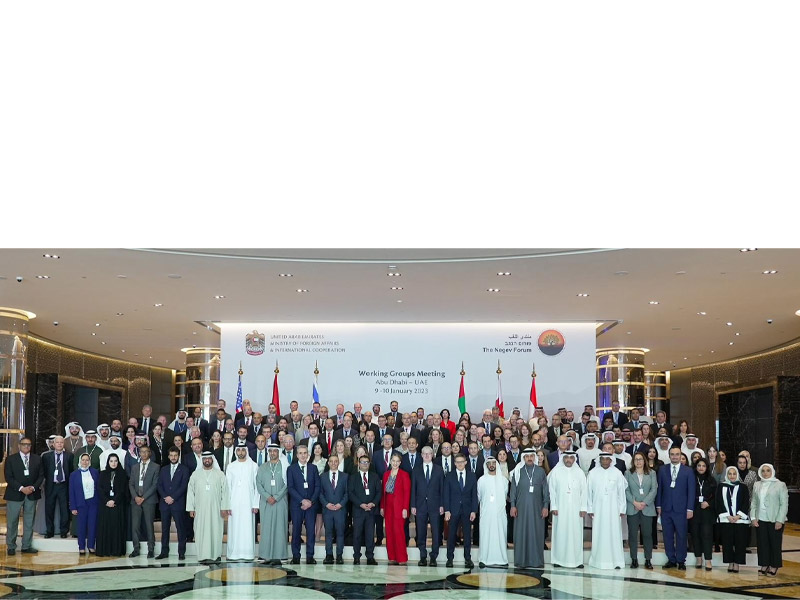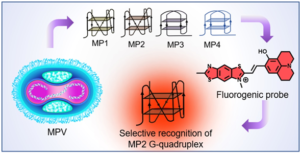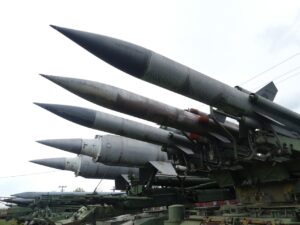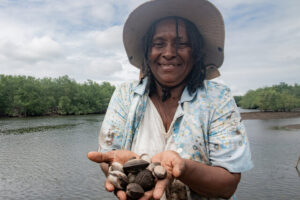
Participants at the Negev Forum meetings in Abu Dhabi. Photo: UAE Ministry of Foreign Affairs
Abu Dhabi/Washington/Jerusalem: Concerned over the absence of Jordan from the two-day Negev Forum working groups meetings during the week here, the United States today said it would brief Amman and “those who are not here” about the deliberations and achievements “in the hopes that they may join in the future”.
A large delegation of senior officials from the US Government is attending the first meeting of the Negev Forum working groups in Abu Dhabi, joining representatives from the Governments of Bahrain, Egypt, Israel, Morocco, and the United Arab Emirates in an effort to advance initiatives to encourage regional integration and cooperation. The meeting of the Negev Forum steering committee and working groups opened here on January 9, 2023.
Israel stated that the delegations will prepare the Negev Forum foreign ministers summit, which is expected to take place in the coming months in Morocco with the participation of Israel’s Minister of Foreign Affairs Eli Cohen.
Jordan has demanded Palestine’s presence as a pre-condition to participate in the Forum. US President Joe Biden, despite all efforts, failed to convince Palestine to join the meetings.
It may also be noted that the King of the beloved Jordan, are the Custodian of the Islamic and Christian holy sites in Jerusalem, including the Holy Sepulchre and the Greek Orthodox Patriarchate of Jerusalem.
Counsellor of the Department of State Derek Chollet said the outcomes of this week’s meetings should prove that the interests of Palestinians were taken into account.
The Negev forum is one of a series of US-led initiatives to promote integration in the region as a foundation for an increasingly more secure and prosperous region. These initiatives include the expanding bilateral relations between Abraham Accords signatories, the I2U2 – a grouping of India, Israel, the United Arab Emirates, and the United States, which is developing clean technology and food security initiatives following President Biden’s visit to the region last year.
The USA today lauded the progress made at the Forum which brought together senior representatives from Arab countries and Israel and voiced hope that Jordan and Palestine would join future meetings.
In light of the escalated tension between Israel and Palestine since the former waged two wars on Gaza in the last three years, and 2022 proved to be the bloodiest year for the Palestinians since the second intifada and their economic conditions worsened, the USA said the process at Abu Dhabi “is not a substitute for Israeli-Palestinian peace”.
“We support the normalization of relations between Israel and its Arab and Muslim-majority neighbours and countries around the world, but it’s not a substitute. We believe – and we’ve heard from participants in the Negev process as well – that normalization can and should be leveraged to advance progress on the Israeli-Palestinian track,” Price said. He pointed out that the Negev process really kicked off in earnest just last year. “It was in March of last year when Secretary [Antony J ]Blinken was in the Negev Desert, in Sde Boker, with his counterparts. So this is a process that is relatively new…Secretary Blinken made this clear in March of last year when he was in the Negev. He said that we have to be clear that these regional peace agreements are not a substitute for progress between Palestinians and Israelis,” Price said.
The US feels that countries involved in the Abraham Accords and other normalization agreements, as well as those that have longstanding diplomatic relations with Israel, can support the Palestinian people, how they can support the Palestinian Authority in concrete ways and have a positive impact on the daily lives of Palestinians in the West Bank and Gaza. “There are several of these countries involved in the Negev process that are doing quite a lot for the Palestinian people; there are other countries that have normalized relations or have diplomatic relations with Israel who are doing quite a lot for the Palestinian people. The United States is doing quite a lot for the Palestinian people on a basis of people-to-people ties. But this is an ongoing conversation, and it’s a conversation that we believe can and really must support our goal of Palestinians and Israelis enjoying equal measures of freedom, of security, of stability, of democracy, and of dignity,” Price said. He further asserted that every time the United States of America engages with Israel in a substantive way, both discuss issues pertaining to Israeli-Palestinian relations. “We discuss the need to improve the day-to-day lives of Palestinian – Palestinian civilians. We discuss ways we can make tangible advancements, tangible progress towards a negotiated two-state solution,” Price said.
The Abu Dhabi meetings follow the March 2022 Negev Summit held in Kibbutz Sde Boker, Israel, which launched the Negev Forum, as well as the June 2022 steering committee meeting in Bahrain, where the six topical working groups – focused on regional security; clean energy; food and water security; health; tourism; and education and coexistence – were set up.
The working groups seek to advance coordinated initiatives to encourage regional integration, cooperation, and development to promote security, peace, and economic prosperity for the benefit of the people of the region, including initiatives that could strengthen the Palestinian economy and improve the quality of life of Palestinians.
“More than two years after the anniversary of the Abraham Accords and other agreements, we continue to see numerous benefits throughout the Middle East, including regional – including increasing economic relationships; more robust people-to-people ties; growth in tourism; direct flights; cultural, research, and academic exchanges; and better coordination on a range of other issues,” US State Department spokesperson Ned Price said in Washington. He added that the Biden administration remains focused on strengthening and expanding these opportunities whenever possible.
– global bihari bureau





